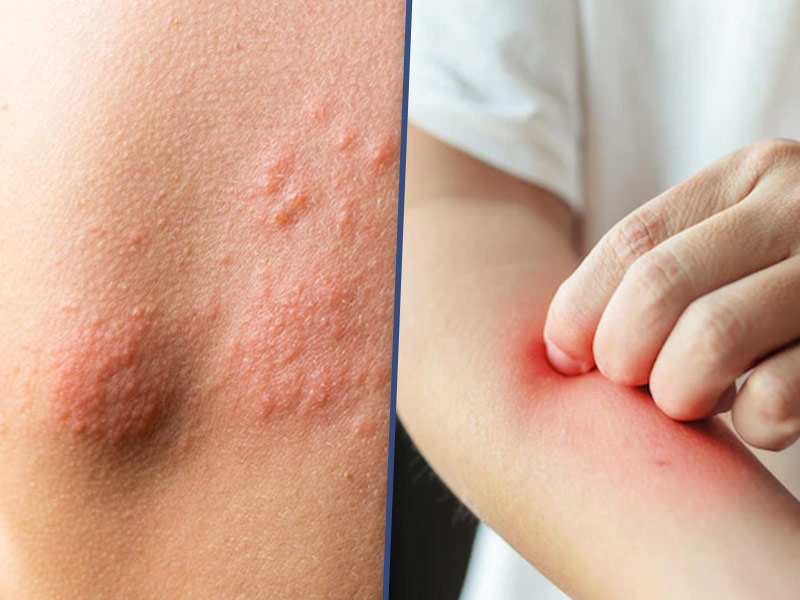
How well do you know Atopic Dermatitis (AD)? Of course, you might think that it’s a normal skin allergy. Or that it just happens to children? But did you know that while AD is mostly diagnosed in childhood, an estimated 1 in 4 adults with the disease, experience the onset of initial symptoms after the age of 18. The majority of affected individuals have a resolution of disease by adulthood, however in 10%–30% of children AD persists into adult life. Therefore, it’s important to debunk the myths around AD for optimal care and better quality of life. Dr. Nina Madnani, Dermatology Consultant at 2 Tertiary Care Hospitals explains everything in detail in this article.
Table of Content:-
Atopic dermatitis causes
Atopic dermatitis (AD) is a chronic inflammatory long-lasting disease and the most common form of eczema, which is characterized by dry, itchy skin that oozes or can weep clear fluid when scratched and flares up periodically. It affects 25% children along with 2 to 3% of adult population in India.
Myths About Atopic Dermatitis
Here are 5 common myths about atopic dermatitis, which you should know:
#1 Itchy skin isn’t a big deal
The dry, irritated skin that is a result of AD may not seem like a serious health issue in the beginning. However, it steadily increases and leads to long term skin damage and many studies have also shown that, about 90% of AD patients experience daily itch. Atopic Dermatitis negatively impact quality of life (QOL), increasing the risk of physical and mental health leading to anxiety, depression, other comorbid condition and even suicide.
Also Read: All About Seborrheic Eczema, A Skin Condition Explained By Dermatologist

#2 Atopic dermatitis is another name for Eczema
Eczema is a general term that includes many conditions which cause hyper-irritability of the skin. However, Atopic Dermatitis is the most common and excruciatingly agonizing form of eczema, a disease which is still under-recognized and inadequately managed in India. It affects 15 to 20% of the paediatric population worldwide and around 25% in India.
#3 Atopic dermatitis is contagious
AD is not a contagious disease under any circumstances, nor can anyone get infected by it whether by contact with the skin or otherwise. Family history or past allergies are one of the key reasons with the primary risk factor for atopic dermatitis, Hay fever or asthma, are part of the same genetic complex.
#4 Only kids get atopic dermatitis
Atopic dermatitis in children is most common. While it is a fact that AD is most often diagnosed in childhood and shows signs before a kid reaches his/her first birthday. However, more than 40% of adults have moderate to severe disease. In adults, there are factors like polluted environment, foods, low or high humidity, long hot showers, and stress that might trigger AD.

Also Read: 8 Natural Remedies To Treat Eczema
It is, therefore, important to pay attention to the warning signs and consult the dermatologist before the itching and the rashes get severe. Early diagnosis and timely treatment are the key to controlling AD.
#5 Atopic dermatitis will get better on its own
AD is considered as one of the common but extremely agonizing inflammatory skin diseases. Moderate-to-severe atopic dermatitis is characterized by rashes that can potentially cover much of the body and can include intense, persistent itching, skin lesions and skin dryness, pain, cracking, redness, or darkness, crusting and oozing. The burden is even higher among patients with inadequately controlled AD. It requires a planned treatment.
Adults specially take help from OTC products to treat the disease. However, it may help calm the skin for a short period, but it will not have any effect on the excessive itching that leads to increased infection and severity of AD.
It is better to visit the dermatologists if the skin rashes are frequent or increasing on the body. Treatment and managing AD depends on the severity and extent of the disease. It consists of a combination of trigger avoidance, skin care and medications for inflammation. In some cases, even the medications available today in the country are not adequate. Wherein, it becomes important for government health authorities to facilitate the availability of newer therapeutic options like biologics which are globally available for patients who suffer from moderate-severe forms of AD.
Conclusion
There is lack of awareness about the disease and hence it’s a growing concern. AD can be successfully controlled and treated with proper consultation from dermatologists along with lifestyle changes to control the severity.
Image credits- freepik
Also watch this video
How we keep this article up to date:
We work with experts and keep a close eye on the latest in health and wellness. Whenever there is a new research or helpful information, we update our articles with accurate and useful advice.
Current Version
